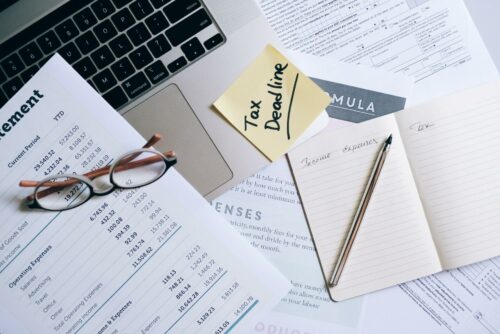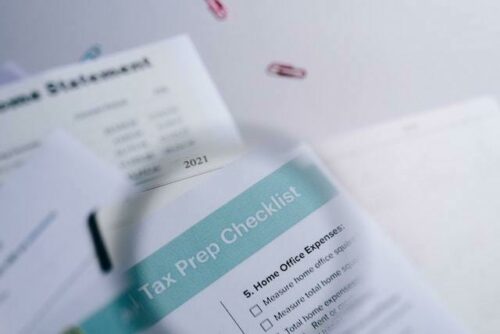Don't Miss your Self Assessment Tax Return Deadline 2022
Aug 2022
The end of the 2021-22 tax year has passed, but that doesn’t mean that you’re out of the woods just yet. In fact, the work is just beginning. In what seems like an endless stream of numbers detailing expenses, transactions, invoices and more, you need to start preparing for your Self Assessment deadline 2022.

“It’s months away!” we hear you cry. But finance isn’t always so simple. There are a number of important dates and regulations that you have to bear in mind while filling out your Self Assessment information. If you want to fill it out correctly, then a caffeine fuelled all nighter at the end of January isn’t the way you want to do it.
So let’s double check your Self Assessment for 2022.
Important Self Assessment deadlines 2022
The first (and most vital) action that any self employed individual must do, is to register for Self Assessment on time. This is partially to make sure that you complete your tasks in a timely manner and to make sure that the taxman knows that you’re completely above board.
During 2021 all businesses had an extra bit of leeway to account for the disruption caused by Covid, however, HMRC will not be so generous this year!
Register for Self Assessment by the 5th of October 2022!
It’s quick and simple to complete. In fact, it’s the easiest part of the entire process. You simply need to visit gov.uk to register. You must finish your registration for Self Assessment if you are:
Next, you’ll have to make sure to submit your Self Assessment by the following deadlines.
| Assessment | Deadline |
|---|---|
| Paper Tax Returns | 31st October 2022 - Midnight |
| Online Tax Returns | 31st January 2023 - Midnight |
| Pay Owed Tax | 31st January 2023 - Midnight |

Year end for limited companies
While sole traders have the benefit of fixed date deadlines for their tax returns, limited companies don’t. Whereas the Tax Year for everyone else runs from April to April, limited companies function on a yearly accounting period based on when they were first set up.
Companies can change their accounting period, but for many it’s common practice to set up the April to April model, or a January - December model for the simplicity of practice.
For limited companies, there’s a 9 month limit on paying
your corporation tax. And, it all depends on when your accounting period
ends. So, for those limited companies that have a year end in December, make sure you’ve completed your tax by September 2022!
Quick checklist for Self Assessment 2022
Self Assessment is one job on your list that is worth doing
properly. So save yourself from furiously filling in spreadsheets and
mashing buttons on your calculator while beneath a mountain of receipts.
Before you submit your Self Assessment this year, there are a few quick
items that you should check.

Collate expenses
Collating expenses is important. The more expenses you can claim, the lower your overall tax will be. In some cases, if you account for enough expenses you can be placed in another tax bracket altogether!
However, you need to be careful about it. Personal and business expenses must be separated accordingly. If you falsely claim expenses on items that are not permissible then you could be opening up your business to audits and fines.
Only include expenses that are “wholly and exclusively” relating to your business - and make sure you account for all of them!
Account for mileage
An overlooked part of Self Assessment is your mileage log. It’s easy to claim back mileage on tax as long as you can provide just reasoning for travel relating to your business.
You can use accounting software to update your mileage logs
throughout the year, keep a record of business trips or however is most
convenient for you.
Unlock your business growth and find your funding
Chase up unpaid invoices
The awkward conversations are the worst, but they’re the ones that need to happen.
Worse than that however, is submitting a skewed Self Assessment. If you haven’t chased down those unpaid invoices, that’s exactly what’ll happen at the end of every tax year. With the right accounting software, you can monitor invoices at all times and chase up unpaid ones before they become an issue.
Cross reference bank statements
Playing “spot the difference” between your expense reports and your bank statements isn’t the most fun in the world, but it’s vital.
You need to identify discrepancies and pinpoint the mistake
in your calculations before submitting your Self Assessment. Better
that you find it than HMRC.
Verified payroll
Obviously, this only applies if your business has employees, but it’s another vital (yet time consuming) aspect that has to be completed.
You need to update employee details, account for pay rises
within the last year and also log any employee bonuses that’ve been
distributed. This, is on top of the constant work it takes to maintain
your payroll.
Obviously, this only applies if your business has employees, but it’s another vital (yet time consuming) aspect that has to be completed.
You need to update employee details, account for pay rises
within the last year and also log any employee bonuses that’ve been
distributed. This, is on top of the constant work it takes to maintain
your payroll.

Should I submit my Self Assessment earlier?
As long as you’ve organised yourself and kept comprehensive records of your finances, there are no reasons to postpone your Self Assessment.
In fact, submitting your Self Assessment earlier provides only benefits for you because submitting earlier doesn’t mean paying earlier.
Regardless of how early you submit your Self Assessment,
the deadline for payment isn’t affected. You now have more time to
budget your finances accordingly! On top of that, you could well face a
flurry of unexpected business just when you need the extra hours to
complete your Self Assessment, so better to be prepared!
What if I fail to meet the Self Assessment deadline 2022?
Then, you’ll get a swift fine for your tardiness.
For submitting a Self Assessment up to 3 months late,
you’ll face a £100 fine on top of your tax bill. This can be appealed
against if you have a good excuse, but it’s better to just get it done earlier.

Making Tax Digital for Income
Self Assessments will be necessary for 2022, but pretty soon they will no longer be needed thanks to the UK government's new making tax digital for income scheme.
In essence, the scheme aims to replace a single annual Self Assessment with quarterly financial reports from software compatible with the HMRC service. It not only cuts down on Self Assessment fraud, but aids businesses by keeping everything digital and easy to complete. Due to the nature of quarterly reports it also allows businesses to more accurately forecast their finances and tax values for the end of the year.
The scheme is available now for businesses who want to make
the switch, however businesses should be prepared to make the
transition to MTD by 6 April 2024, and general partnerships by 2025.
Conclusion
Taxes and finances in general become complex very quickly. In fact, the best way to keep them accurate is to stay on top of them with sophisticated accounting software that can track, record and analyse your accounts on a daily basis.
With our AI software you can consolidate all your expenses, invoices and general cashflow on a single, easy to use platform. In just a few keystrokes you can generate management reports, alter payroll and much more!
Our unique blend of advanced software and dedicated accountants provide a range of support that doesn’t just support your finances, it elevates them. You can focus less on the numbers and more on the business, especially with our dedicated CFO services and R&D Tax Credit specialists!
Talk to one of our specialists today and find out more about our accounting software for businesses. Make sure to sign up to the School of Startups and gain valuable advice from successful CEOs and entrepreneurs from all sectors!
#1 finance partner for tech & e-commerce startups
- 100% online
- All in one accountancy, R&D and CFO services
- 9/10 customers recommend us

Educational content just for startups. As a member, you’ll get unlimited access to an extensive range of guides, blogs and advice to help you run and grow your business.


